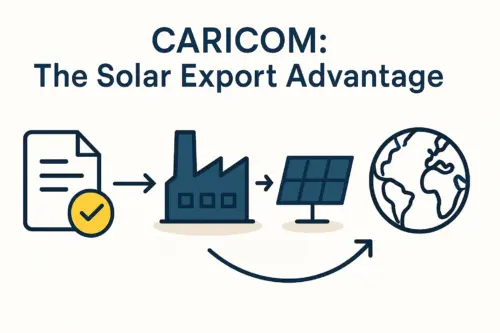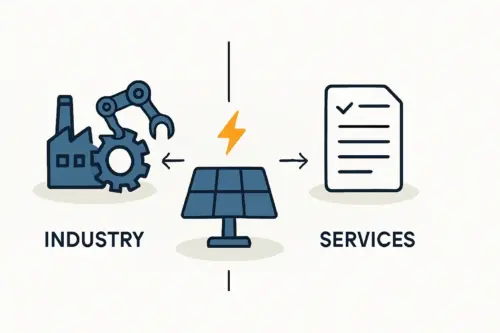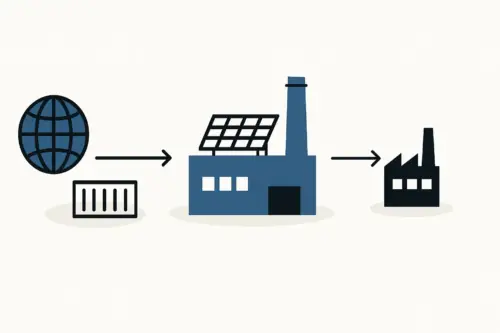Imagine an operations manager for an oil and gas company in southern Trinidad. His team is responsible for a dozen remote wellheads scattered across a field, far from the national grid. Every week, they face the logistical challenge of transporting diesel fuel to power the monitoring equipment at each site. The costs are high, the risk of fuel theft is constant, and a single generator failure can lead to costly data loss and operational downtime.
This scenario is not hypothetical; it’s a persistent and expensive reality for Trinidad and Tobago’s most vital industry.
While solar power is an obvious solution, this article explores a more specific and strategic opportunity: how a local solar module manufacturer can serve this high-value industrial niche in ways that generic, imported panels cannot. For an entrepreneur considering entry into the solar manufacturing space, this represents a focused, defensible, and highly practical starting point.
The Unique Energy Challenge in Trinidad and Tobago’s Oil and Gas Fields
As the largest producer of oil and natural gas in the Caribbean, Trinidad and Tobago’s economy is intrinsically linked to the energy sector. A significant portion of these operations—from onshore exploration sites and pipeline monitoring stations to offshore platforms—is located in remote areas without access to reliable grid electricity.
Traditionally, these operations rely on diesel generators for essential functions such as:
- SCADA Systems: Powering the sensors and communication hardware that monitor pipeline pressure, flow rates, and equipment status.
- Security: Running surveillance cameras and perimeter lighting to protect valuable assets.
- Communications: Ensuring reliable radio and satellite links between the field and central control rooms.
This reliance on diesel creates substantial operational burdens. The constant need for fuel procurement, transportation, and generator maintenance introduces complications that compromise the efficiency and security of these critical industrial sites.
Why Standard Solar Solutions Often Fall Short
The default solution for many industrial operators is to import standard solar modules from the international market. While this can be a step up from diesel generators, it comes with its own set of challenges, particularly for demanding industrial applications.
-
Supply Chain Vulnerability: Dependence on international shipping can lead to long lead times, customs delays, and unpredictable costs, making it difficult to plan and execute projects efficiently.
-
Lack of Customization: Mass-produced panels are designed for the residential or large-scale utility market. They may not be robust enough to withstand the specific environmental conditions at an industrial site, such as corrosive salt mist in coastal areas or high vibrations near heavy machinery.
-
Limited Local Support and Replacement: If an imported panel fails, finding an exact replacement can be difficult and time-consuming. After-sales support from an international supplier is often slow and impersonal.
These factors create an opening for a more tailored, responsive, and ultimately more reliable solution—one driven by local production.
The Strategic Advantage of Local Solar Module Manufacturing
A domestic solar module factory can address the specific pain points of the oil and gas sector, creating a powerful competitive advantage. The value is not in competing on price with global mass producers, but in delivering a superior, specialized solution.
Customization for Industrial Needs
A local manufacturer can design and build modules specifically for the harsh conditions of oil and gas operations. This could involve incorporating features like:
- Reinforced Frames: To withstand higher wind loads and potential vibrations.
- Specialized Coatings: To protect against corrosion from salt spray or industrial pollutants.
- Durable Junction Boxes: Sealed to a higher standard to prevent moisture ingress.
This ability to tailor a product to a customer’s exact needs is a key advantage.
Enhanced Supply Chain and Local Content
Producing modules within Trinidad and Tobago eliminates international shipping complexities and reduces project lead times. It also allows oil and gas companies to meet local content requirements, which can be a critical factor in procurement decisions for state-affiliated and major international operators.
For a new manufacturing venture, understanding the cost to produce solar panels locally is the foundational step in building a business case around this advantage.
A Practical Look at the Application: Powering a Remote Wellhead
To make this opportunity tangible, consider the energy needs of a single remote oil wellhead.
-
Typical Power Load: A combination of a SCADA system, security cameras, and communication equipment might require a continuous supply of 200–500 watts.
-
The Traditional Method: A small diesel generator would need to run for several hours a day, if not continuously, consuming fuel and requiring regular maintenance checks.
-
The Local Solar Solution: A small, self-contained solar power system, featuring a 2-4 kW array of locally manufactured, high-durability modules and a battery bank, could provide uninterrupted, autonomous power. Crucially, the modules are built for the environment, and the system is supported by a local team.

This shift from a high-maintenance, fuel-dependent system to a reliable, autonomous power source offers a compelling return on investment for the operator. For the entrepreneur, this type of specialized application forms a key part of a successful solar panel manufacturing business plan, demonstrating clear market demand.
Frequently Asked Questions (FAQ)
Q: Is the oil and gas market large enough to support a local solar factory?
A: While this is a niche market, it is also a high-value one. The goal for a new entrant is not to compete with commodity residential panels, but to become the preferred supplier for a critical industrial sector. This provides a stable and profitable foundation from which a factory can later expand into other markets.
Q: What kind of solar modules are needed for these applications?
A: The primary requirements are durability and reliability. This often means modules built with thicker glass, stronger aluminum frames, and components certified for harsh environments (e.g., salt mist resistance). A local manufacturer can source and assemble these specific components to create a purpose-built product.
Q: Don’t oil and gas companies prefer established international brands?
A: Industrial operators prioritize operational continuity and a low total cost of ownership above all else. A local manufacturer that can demonstrate a more durable product, offer responsive on-the-ground support, and guarantee supply chain stability presents a powerful business case that directly addresses these core priorities.
Q: What is the typical investment to start such a factory?
A: The scale of the operation can be tailored to the target market. A small-to-medium-sized facility with an annual capacity of 20–50 MW is a common and effective starting point for serving specialized industrial and commercial markets. The precise investment required for a solar panel factory will depend on the chosen level of automation, building specifications, and local labor costs.

Seizing a Focused Opportunity
The energy needs of Trinidad and Tobago’s off-grid oil and gas operations represent a clear and persistent problem. This problem requires a specialized, reliable, and well-supported solution—precisely what a local solar module manufacturer is uniquely positioned to provide.
For entrepreneurs and investors looking to enter the renewable energy sector, this niche offers a strategic advantage. Rather than competing in the crowded global market, it allows a new business to build its foundation by solving a critical challenge for the nation’s most important industry. It is an opportunity grounded in providing tangible value, enhancing industrial efficiency, and building local capacity.







